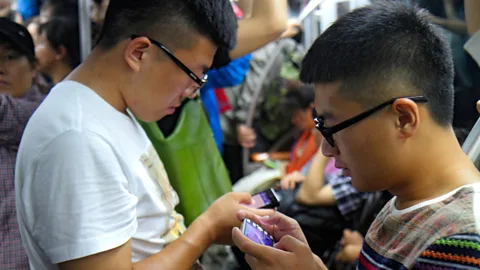Why China is obsessed with numbers
 jeremy sutton-hibbert/Alamy
jeremy sutton-hibbert/AlamyThe Chinese fascination with numbers – and how much they are part of both online and offline lives – is a societal quirk that baffles long-term tourists and expats alike.
As a newly minted Beijinger, there were certain things my brain quickly scrambled to make room for: the exact time I needed to leave home in the mornings to avoid being squashed into human dumpling filling on the rush-hour subway ride; the location of the best spots for mala xiang guo (a stir-fried version of hot pot); to never flush toilet paper; and to never, ever attempt eating a soup dumpling by putting it straight into your mouth (poke and slurp, people!).
One task, though, seemed impossible: ing my QQ number, a string of randomly assigned digits that served as the identification for the QQ messaging service our office – and many others in China – used.
As the only foreign employee in my department, I was also clearly the only one with this problem. My Chinese co-workers had no difficulty rattling off their own 10-digit, or in some cases nine-digit, IDs. No-one else felt the need to run over to his or her computer like a total idiot to check every time someone asked them. In case you didn’t realise, that idiot was/is me. Since that day two years ago, when a colleague helped me set it up, I’ve never once signed out of my QQ , nervous that I’ll not be able to log back in at all. If you asked me what my QQ ID was, after more than 104 weeks of living in China and using this messaging service, I would not be able to tell you.
I once asked the British guy working in the office next to ours if he ed his. He did not. Neither could my two American friends. “What do those numbers mean?” we’d whined to each other. “There’s no order of any kind to them. Why not just use letters?!” I had been tempted to place the blame squarely on our collective terrible memories but turns out, there was possibly more to this. None of the locals we’d asked seemed to find anything unusual about ing not only long strings of QQ digits, but also various other sets of numbers in other areas of their everyday lives. They turned up in website domain names. They were part of internet slang. Certain numbers assumed significance in cultural beliefs: some were auspicious; others were to be fled from at all cost. Once I started looking, it seemed living in China meant being constantly bombarded by numbers, much more so than in other countries and cultures. And none of my Chinese co-workers or friends were quite sure why.
 jeremy sutton-hibbert/Alamy
jeremy sutton-hibbert/Alamy“I’ve heard the train fares on the CTrip website are kinda high,” my Sichuanese roommate Panbi told me, back when I first moved here, as we discussed my Chinese New Year travel plans. “Why don’t you try 12306?”
You may also be interested in:
“Um. Is that a helpline number?” I’d asked, adding that I wasn’t sure my Mandarin skills were up to scratch yet. Turns out, no, it wasn’t a helpline. 12306.cn is China Rail’s official website and app. You know, just like email service websites 163.com and 126.com. While trying to find out exactly why all of them were named thusly, I found a very puzzled (non-Chinese) ’s post on a software company’s forum. “Are 126.com and 163.com fake email addresses?” he asked, with some consternation. “I noticed a number of email addresses for our with [these] domain [names]. From what I've been able to tell via limited research, these domains could potentially be fake.” Other s quickly clarified that they were legitimate addresses. No-one, though, explained why.
Or wait, almost no-one. Turns out the reason was likely the same as the one behind every one of my life choices: it involved the least effort. As Frankie Huang, a writer and strategist based in Shanghai, told me over email, numbers are far easier to type for purposes like websites’ names, as compared to pinyin, the Romanised system for Chinese characters.
“Not everyone in China has perfect grasp of pinyin. If websites have pinyin names, it might actually be difficult for some people to figure out which letters to write,” she said. A string of numbers is easier to commit to memory than words in a foreign language.
Also, because numbers involve just a single keystroke, you can type much faster. “This was a particular advantage back when phones had real keypads and you had to hit number keys multiple times for letters,” Huang added. “Nobody has time for that.”
 Lou Linwei/Alamy
Lou Linwei/AlamyUnlike the QQ IDs, the digits in a website name usually aren’t random, explains Christopher Beam in his New Republic essay. For instance, 163.com is the website address of Chinese internet company NetEase. It’s a throwback to the days of dial-up, when customers had to enter 163 to go online. “The phone companies China Telecom and China Unicom simply re-appropriated their well-known customer service numbers as domain names, 10086.cn and 10010.cn, respectively.”
This is also where homophones get involved. Though ‘1’ is called yi in Mandarin, when pronounced as part of a string of numbers, it turns into yao. Among e-commerce conglomerate Alibaba’s various platforms is 1688.com, with the numbers pronounced ‘yao-lio-ba-ba’ in Mandarin. Get it?
Some, like McDonald’s (phonetically translated in Mandarin as ‘Maidanglao’, until they changed their name in 2017) decided to get more creative. You can order your McMuffin online by typing 4008-517-517.cn because ‘517’ in Mandarin is ‘wu yao qi’. Almost like ‘wo yao chuh’ or ‘I want to eat’ (‘chuh’ is the closest phonetic spelling for ‘chi’, the actual word for ‘eat’). Website 51job.com sounds awfully close to ‘I want a job’, and the ‘6’ in video-streaming site 6.cn’s address is a near-homophone for ‘to stream’, writes Beam. All Chinese digits are monosyllabic, making them easier to as sounds, or a short, catchy chant.
 ZUMA Press, Inc./Alamy
ZUMA Press, Inc./AlamyWhile this societal fascination with numbers truly becomes apparent once you have lived in China long-term, it’s often something tourists might notice too. The first time I encountered the cultural quirk was years ago, on my first trip here. I was in the city of Taizhou, spending a few days with my dad. He worked there, flying back and forth between Taizhou and Mumbai every couple of months. On my way up to his apartment, I noticed the lift had no fourth floor. There was 1, there was 2 and then there were 3A and 3B. Months later, when I had moved to China myself, I kept coming across elevators that had resolutely decided to not acknowledge 4.
The reason is that the pronunciation of the word ‘four’ in Mandarin sounds way too close for comfort to the word for ‘death’. Which, in the case of the more-orthodox Chinese people, necessitated banishing the number entirely. A co-worker gently suggested I remove one of the four hand-painted coasters I had brought from India for my boss before presenting them to her. My real estate agent informed me, strictly off-record, that often, apartments numbered 4 or 44 tended to be rented out to foreigners. “Many times, the local Chinese people don’t want to live there,” she said, instantly making me house 44 inside Qianmachang Hutong in Beijing, where my very American ex-boyfriend had lived.
Huang says her apartment building in Shanghai is “an extreme example of numerical superstition”. It ascribes to not only Chinese, but also Western numerology. Along with leaving out floors 4, 14, 24 and 34, it has also done away with 13. “Once, I was looking at our building from the outside with my husband and we tried to figure out which floor was ours by counting up,” Huang recalled. “[We then realised] that the floor numbers are meaningless as they're all wrong.” 13 was actually 14; 23 was actually 20.
 Zoonar GmbH/Alamy
Zoonar GmbH/AlamyNumber 8, on the other hand, is the luckiest, as it sounds like the Mandarin word for prosperity. Car number plates with multiple 8’s have likely been paid a fortune for by their owners, and the ornate ‘88’ building number outside Mr Shi’s Dumplings in Beijing is essentially an announcement to any potential competitors that they are doing very well indeed, thank you very much. If you happen to get an 888 in your phone number, you could likely sell it for a pretty good price.
Numbers also lend a sense of solidness, apparent from the government’s fondness for incorporating them into official policies. There’s the ‘Four Comprehensives’ put forth by Chinese President Xi Jinping, another heartening moment of redemption for the number 4 after Chairman Mao advocated for the destruction of the ‘Four Olds’ – Old Ideas, Old Culture, Old Customs, and Old Habits – during the Cultural Revolution. Because official policies are kept separate from cultural superstition, it’s irrelevant how “lucky” a number is. Former General Secretary of the Communist Party of China Jiang Zemin had the ‘Three Represents’. Xi’s predecessor Hu Jintao had the slightly more bluesy-sounding ‘Three Supremes’, but then made up for it with the very serious ‘Eight Honours and Eight Shames’ – also the title of the lecture my Indian parents gave me the second I hit puberty.
 Education & Exploration 3/Alamy
Education & Exploration 3/AlamyThen there’s the wide, wild world of Chinese internet slang, where dodging censors (or just nosy parents) means homophonic numerals are popular. So 748 is telling someone to go to hell, 555 basically means a crying emoji, 233 means you’re laughing, and 520 is ‘I love you’. And if you wanted to really kick it up a few notches, there’s 2010000, which means ‘I love you for 10,000 years’. How’s that for your Valentine’s Day Instagram hashtag?
Why We Are What We Are is a BBC Travel series examining the characteristics of a country and investigating whether they are true.
more than three million BBC Travel fans by liking us on Facebook, or follow us on Twitter and Instagram.
If you liked this story, sign up for the weekly bbc.com features newsletter called "If You Only Read 6 Things This Week". A handpicked selection of stories from BBC Future, Culture, Capital and Travel, delivered to your inbox every Friday.
{"image":{"pid":""}}
